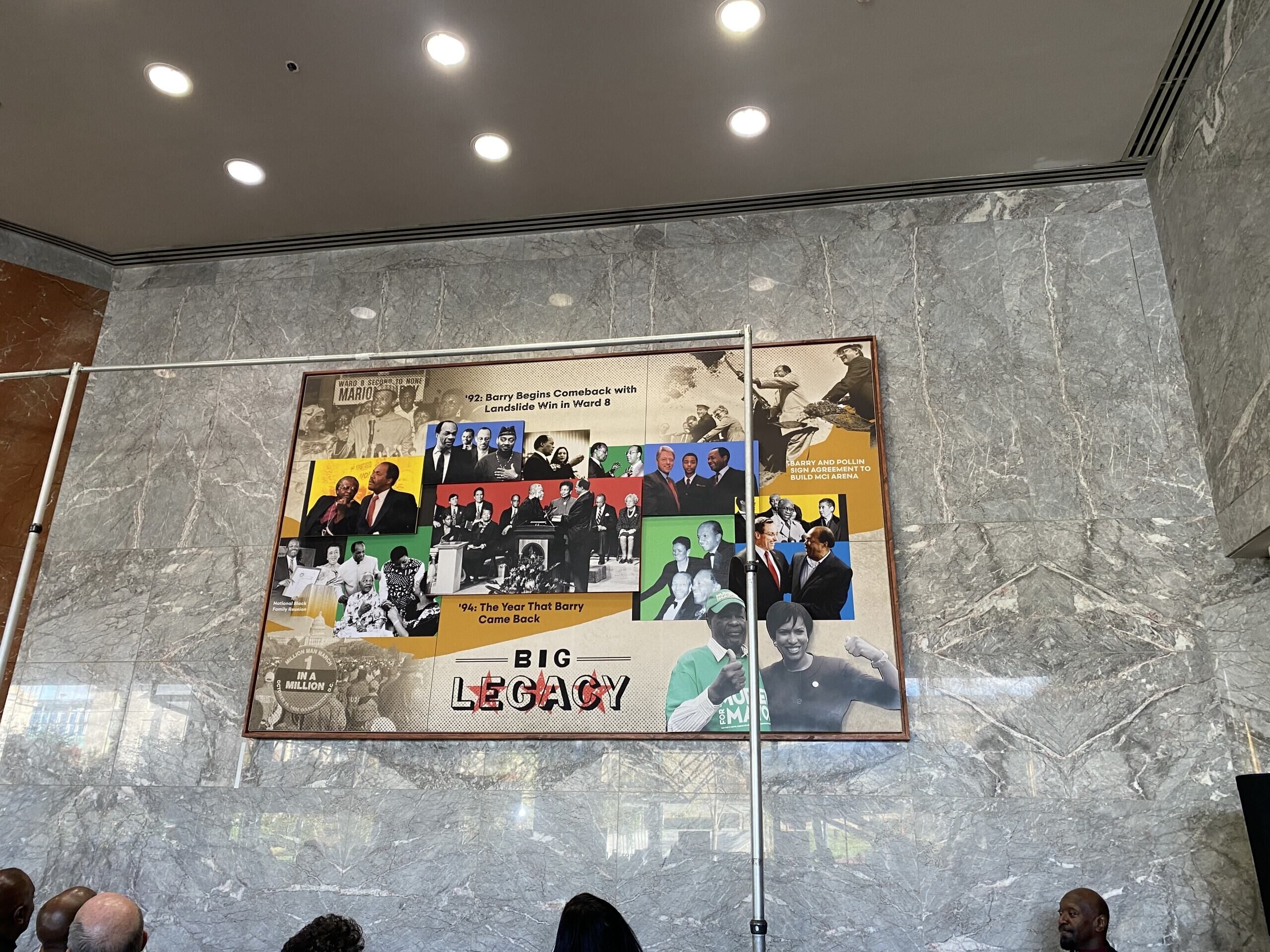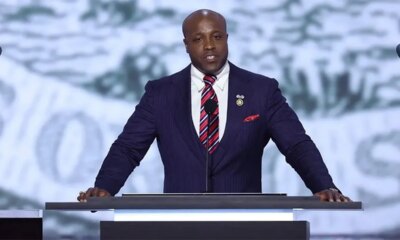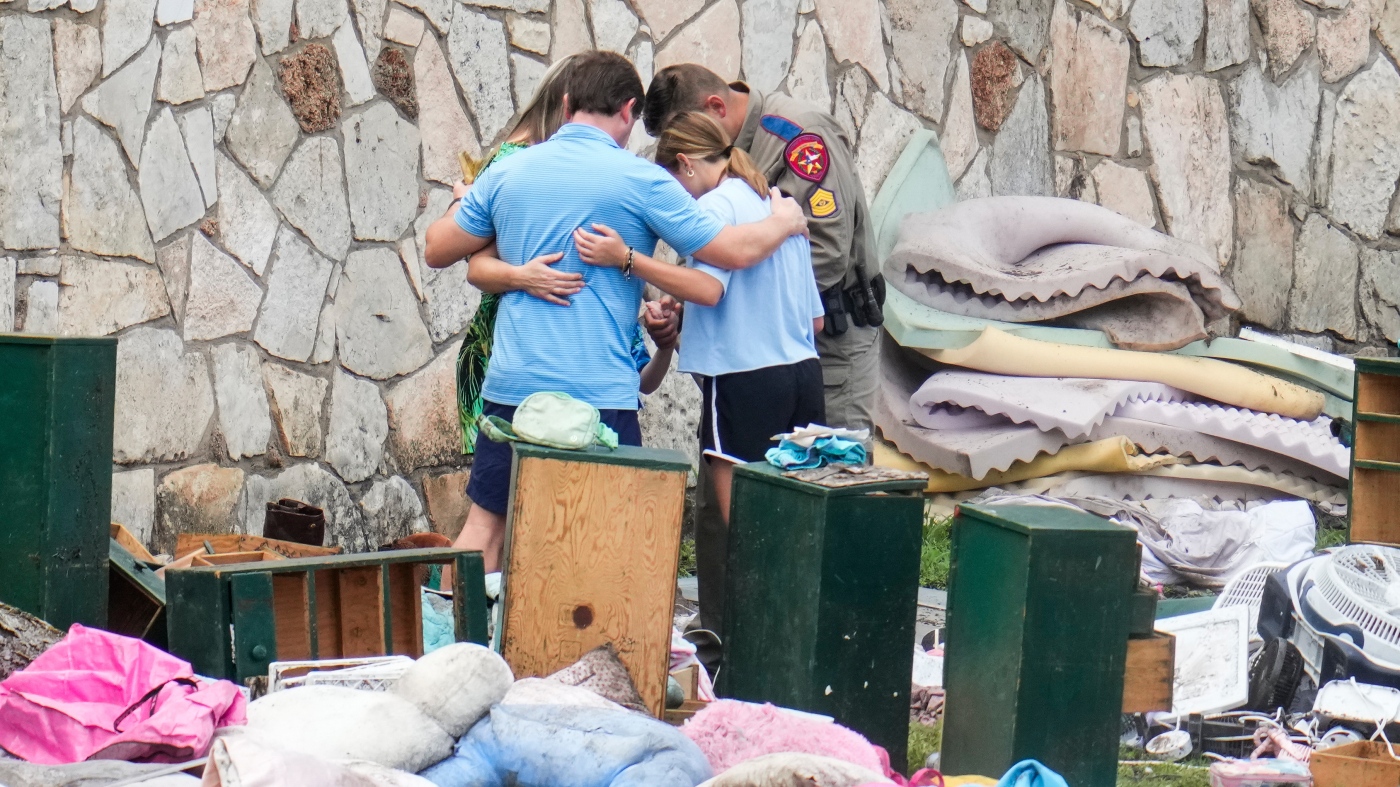Washington, D.C
New mural dedicated to DC’s ‘Mayor for Life’ honors career, contributions of Marion Barry – WTOP News

Ten years to the day after his death, D.C. leaders honored the life of the late Mayor Marion Barry with a new mural hanging in his namesake building.
(WTOP/Luke Lukert)
WTOP/Luke Lukert
(WTOP/Luke Lukert)
WTOP/Luke Lukert
(WTOP/Luke Lukert)
WTOP/Luke Lukert
(WTOP/Luke Lukert)
WTOP/Luke Lukert
Ten years to the day after his death, D.C. leaders honored the life of the late Mayor Marion Barry with a new mural hanging in his namesake building.
Mayor Muriel Bowser joined the former D.C. First Lady at the Marion S. Barry, Jr. Building in Judiciary Square on Saturday to pull the curtain down, revealing the new mural dedicated to the “Mayor for Life.”
“My husband really loved Washington, DC and its residents. The mural captures some of the major contributions he made to the City, and some of the people who worked with him to help build the City and empower its residents,” said Cora Masters Barry, Barry’s widow, in a statement.
“I was thrilled that so many residents and visitors were able to join us on this inspirational, entertaining, educational, and historical day, as we honored a man, Marion Barry Jr., whose legacy and love of this city was so deep and strong.”
The mural is broken into three parts, each with a different title and focusing on a different aspect of Barry’s life.
The first panel, titled “Big Vision,” displays Barry’s early years as a civil rights activist and his transition into politics.
The center panel, “Big Impact,” then focuses on his time in office as a Councilmember and four term mayor.
These sections emphasize Barry’s support for Black-owned businesses, summer jobs for youth, programs for seniors and leadership opportunities for women.
The last section of the mural is titled ”Big Legacy.” It highlights the influence Barry still has on the city — showcasing advocacy against apartheid, support for the Million Man March, contributions to the development of the MCI Center, and his work with the DC Control Board.
The many pictures show Barry beside the likes of President Bill Clinton, Nelson Mandela and Martin Luther King Jr.
Another focus of this panel is Barry’s political comeback after a high-profile arrest and conviction on crack cocaine possession charges in 1990. Four years later, he returned to the Mayor’s office after a commanding primary run.
“He told me a lot of things, and he taught us a lot of things, but one of the biggest ones was if you get knocked down, you get back up,” said Mayor Muriel Bowser at the unveiling.
Nabeeh Bilal, an artist based in Ward 8, created the mural.
“You’ll notice that there is not a single solo image of Marion Barry, and that’s because, with his accomplishments and achievements, it was always about others,” Bilal said.
Get breaking news and daily headlines delivered to your email inbox by signing up here.
© 2024 WTOP. All Rights Reserved. This website is not intended for users located within the European Economic Area.

Washington, D.C
Deployment of West Virginia National Guard members in nation’s capital can continue, judge rules

A judge on Monday allowed the continued deployment of more than 300 West Virginia National Guard members to patrol the streets of Washington, D.C., as part of President Donald Trump’s push to send the military into Democratic-run cities.
Kanawha County Circuit Judge Richard D. Lindsay made the ruling after hearing arguments in a lawsuit by a civic organization that argued Republican Gov. Patrick Morrisey exceeded his authority when he authorized the Guard’s deployment in August.
West Virginia is among several states that sent National Guard members to the nation’s capital. While the state National Guard has said its deployment could last until the end of November, it is consulting with the governor’s office and others on the possibility of extending the stay.
READ MORE: While wary of Trump’s motives, some D.C. residents uneasily back parts of the National Guard deployment
Formal orders were issued last week extending the deployment of the District of Columbia’s National Guard in the city through the end of February.
“We are pleased with the judge’s decision,” Jace Goins, the state’s chief deputy attorney general, said outside the court in Charleston. “The National Guard are going nowhere. They’re staying in D.C. They’re not going to be redeployed to West Virginia.
“The judge made the determination that the governor made a lawful decision deploying the National Guard to D.C. by a lawful request of the president.”
The West Virginia Citizen Action Group, which filed the lawsuit, argued that under state law the governor could deploy the National Guard out of state only for certain purposes, such as responding to a natural disaster or another state’s emergency request.
The civic group claimed that it was harmed by the deployment by being forced to refocus its resources away from government accountability and transparency. The state attorney general’s office sought to reject the case, saying the group has not been harmed and lacked standing to challenge Morrisey’s decision.
“It was a simple issue of a broad, lawful request by the president and a lawful deployment by the governor. That’s all,” Goins said.
Aubrey Sparks, an attorney for the American Civil Liberties Union’s West Virginia chapter, said she didn’t believe it was the correct decision.
“I think that West Virginia law is clear,” Sparks said. “I think what the state was permitted to do here is to skirt past West Virginia law simply because Trump asked them to. And that’s not how the law works. We remain deeply concerned about it.”
Trump issued an executive order in August declaring a crime emergency in the nation’s capital, although the Department of Justice itself says violent crime there is at a 30-year low.
Within a month, more than 2,300 Guard troops from eight states and the District of Columbia were patrolling under the Army secretary’s command. Trump also deployed hundreds of federal agents to assist them.
A free press is a cornerstone of a healthy democracy.
Support trusted journalism and civil dialogue.
Washington, D.C
Question of West Virginia Guard’s deployment to D.C. is focus in court again – WV MetroNews

A court hearing culminates Monday over whether Gov. Patrick Morrisey is operating within his authority to deploy the West Virginia National Guard to patrol Washington, D.C.
Kanawha Circuit Judge Richard Lindsay heard about two hours of testimony Nov. 3, but delayed making a final ruling until another hearing that he set for 2 p.m. this Monday. The judge already heard about an hour of testimony Oct. 24.
On August 11, President Donald Trump declared a “crime emergency” for the District of Columbia, and five days later Gov. Patrick Morrisey deployed members of the West Virginia National Guard for support.
The governor’s original announcement noted that the mission would be funded at the federal level. That’s a Title 32 order, typically for natural disasters, where the National Guard remains under the control of the state’s governor but receives pay and benefits from the federal government for federal missions.
The 300 to 400 members of the West Virginia National Guard who have been deployed to Washington, D.C., have been operating under Joint Task Force-DC, which says the mission will continue “until law and order is restored.”
The West Virginia National Guard deployment remains active and could be in effect through early next year.
The court case in Kanawha County has challenged the governor’s power to deploy the West Virginia National Guard to the streets of America’s capital.
Similar questions have arisen recently in other courts. A circuit judge in Tennessee is considering the legal basis of Gov. Bill Lee deployment of the Tennessee National Guard as part of the Memphis Safe Task Force.
And a federal judge has been considering legal questions about the extent to which President Donald Trump can use the National Guard to execute his agenda in the District of Columbia. U.S. District Judge Jia M. Cobb said late last month that she would take time to consider the arguments before making a ruling.
In West Virginia law, one key provision outlines the authority of the governor to order the organized militia to active state service, including the ability to order the militia to serve outside the state for training, parades or other duties.
Another describes the governor’s powers to call out the West Virginia National Guard “into the active service of the state” in events like war, insurrection, riot, invasion or public disaster.
ACLU-West Virginia filed the lawsuit on behalf of West Virginia Citizen Action Group. Lawyers for the state Attorney General are defending the governor’s decision to deploy the Guard.
“The deployment of the West Virginia National Guard to Washington, D.C., is not a mere technical violation of arcane statutory provisions,” ACLU legal director Aubrey Sparks wrote in the latest filing.
“The facially unlawful use of military power outside of our state borders, involving the compelled participation of citizen soldiers, is a direct and flagrant attack on the democratic systems that West Virginia citizens, courts, and elected officials have zealously protected for 162 years.”
Lawyers for the state, represented by the Attorney General’s Office, countered that layers of federal law, including the Constitution, give the president the power to request the National Guard and the governor the authority to grant it.
Those lawyers contend that the National Guard is on a support mission, rather than engaging in law enforcement duties.
“In fact, neither the D.C. National Guard nor out-of-District National Guard members are making arrests or engaging in direct law enforcement activity,” wrote Christopher Etheredge, chief deputy attorney general.
“Instead, the D.C. National Guard, augmented by the WV National Guard, are conducting deterrence operations with a focus on presence and visibility.”
Washington, D.C
How Lawmakers Are Responding to the Shutdown

The government shutdown is now the longest in history. Panelists joined Washington Week With The Atlantic to discuss how voters and lawmakers are responding, and more.
Three weeks before Thanksgiving, “the administration has chosen to not find money to fund the food-assistance program for some 42 million Americans,” Jeff Zeleny, the chief national-affairs correspondent at CNN, said last night. “But they have found money for military payments and ICE officers and others. That choice, he added, “is beginning to catch up with the administration and Republicans.”
Meanwhile, “Democrats seem to be much more dug in than they were before Tuesday,” Atlantic staff writer Mark Leibovich noted. “I think they seem emboldened by Tuesday’s elections.”
Joining the editor in chief of The Atlantic, Jeffrey Goldberg, to discuss this and more: Leigh Ann Caldwell, the chief Washington correspondent at Puck; David Ignatius, a foreign-affairs columnist at The Washington Post; Mark Leibovich, a staff writer at The Atlantic; and Jeff Zeleny, the chief national-affairs correspondent at CNN.
Watch the full episode here.
-

 Austin, TX5 days ago
Austin, TX5 days agoHalf-naked woman was allegedly tortured and chained in Texas backyard for months by five ‘friends’ who didn’t ‘like her anymore’
-

 Southwest3 days ago
Southwest3 days agoTexas launches effort to install TPUSA in every high school and college
-

 Seattle, WA1 week ago
Seattle, WA1 week agoESPN scoop adds another intriguing name to Seahawks chatter before NFL trade deadline
-

 Hawaii2 days ago
Hawaii2 days agoMissing Kapolei man found in Waipio, attorney says
-

 World6 days ago
World6 days agoIsrael’s focus on political drama rather than Palestinian rape victim
-

 New Jersey2 days ago
New Jersey2 days agoPolice investigate car collision, shooting in Orange, New Jersey
-

 Seattle, WA2 days ago
Seattle, WA2 days agoSoundgarden Enlist Jim Carrey and Seattle All-Stars for Rock Hall 2025 Ceremony
-

 Southwest7 days ago
Southwest7 days agoArmy veteran-turned-MAGA rising star jumps into fiery GOP Senate primary as polls tighten
























